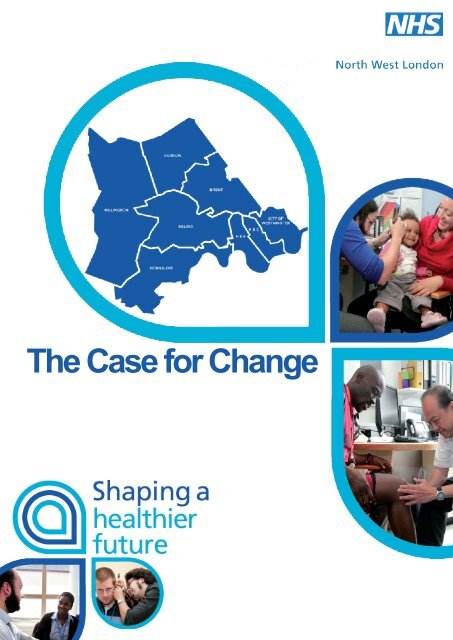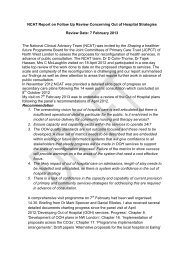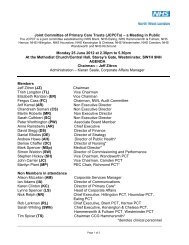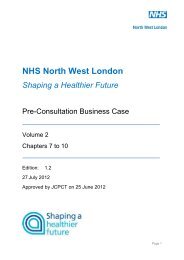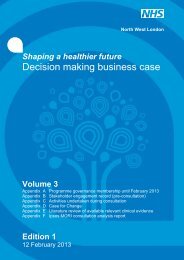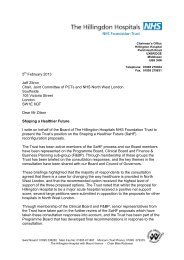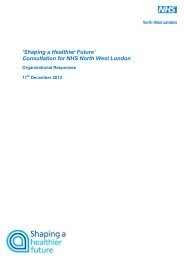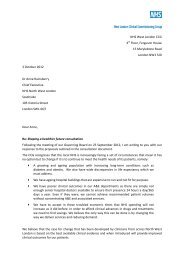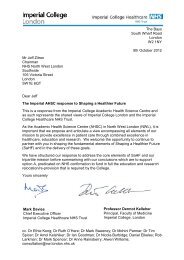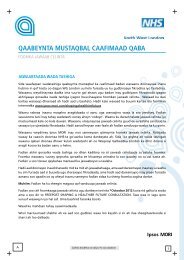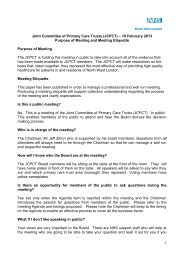NHS NWL Shaping A Healthier Future - The Case For Change ...
NHS NWL Shaping A Healthier Future - The Case For Change ...
NHS NWL Shaping A Healthier Future - The Case For Change ...
You also want an ePaper? Increase the reach of your titles
YUMPU automatically turns print PDFs into web optimized ePapers that Google loves.
<strong>The</strong> <strong>Case</strong> for <strong>Change</strong>
<strong>Shaping</strong> a healthier future for North West London<br />
<strong>NHS</strong> North West London boroughs:<br />
Brent<br />
City of Westminster<br />
Ealing<br />
Hammersmith & Fulham<br />
Harrow<br />
Hillingdon<br />
Hounslow<br />
Kensington & Chelsea<br />
<strong>NHS</strong> North West London plans,<br />
buys and oversees the delivery of<br />
healthcare for nearly two million<br />
residents in eight boroughs. Over<br />
the next few months we will be<br />
working with other <strong>NHS</strong> bodies,<br />
local councils, patient groups and<br />
others to explain why and how our<br />
local <strong>NHS</strong> needs to change.<br />
In June 2012 we intend to launch<br />
a major public consultation on the<br />
plans we develop and the choices<br />
that need to be made. <strong>The</strong><br />
consultation will be led by senior<br />
family doctors on behalf of all the<br />
patients they serve. <strong>The</strong>y will seek<br />
patient and public views, and offer<br />
real choices about how health<br />
services can be better delivered<br />
across North West London.
<strong>The</strong> <strong>Case</strong> for <strong>Change</strong><br />
Why do services need to change<br />
<strong>The</strong> <strong>NHS</strong> in North West London has many good health services, but they are under intense pressure.<br />
<strong>The</strong> population is living longer and more people have long term illnesses like heart disease, diabetes<br />
or dementia. New drugs and advances in medical technology can help people with these conditions<br />
enormously, but they mean that <strong>NHS</strong> costs are rising far faster than the funding available.<br />
What people tell us about their experience of the <strong>NHS</strong><br />
Too many people in North West London end up in hospital when they could stay at home and be<br />
treated by their GP or other community healthcare professionals. Often this happens when it is hard<br />
for patients to find the right healthcare professional. When patients are asked how easy it is to get an<br />
appointment or see their GP or other appropriate local healthcare professional, national surveys put<br />
most of North West London in the bottom 10%.<br />
Healthy lives<br />
A strong <strong>NHS</strong> should help people to lead healthy lives as well as provide high quality, easy-to-find,<br />
care when they are ill. Yet still, residents in some parts of North West London die on average 17 years<br />
earlier than those in nearby areas. We need to try and reduce those differences and make high quality<br />
care available to all, at the right time and in the right place.
<strong>Shaping</strong> a healthier future for North West London<br />
Supporting independence<br />
People with long term illnesses, or who are becoming more frail with age, want help to stay<br />
as independent as possible for as long as possible. <strong>The</strong> <strong>NHS</strong> needs to work better with local<br />
councils and their social care services to provide such support. In parts of North West London,<br />
patients, doctors and other health and care workers are co-operating to make this happen. If<br />
these successful schemes were introduced across all our boroughs, we believe we could<br />
prevent up to 10,000 people a year going into hospital unnecessarily. This would mean better<br />
care, less disruption for patients and carers, and more money for local community services.<br />
Some GP and community services in North West London are well organised to provide a better<br />
alternative to a hospital stay, but others are not. So, currently the hospitals are under strain and<br />
not able to focus on more complicated cases where their expertise is really needed. We need<br />
to spend more money on those services that can be better provided near to people in their own<br />
communites.<br />
Helping hospitals do better<br />
North West London has more hospital space per resident than in other parts of the country.<br />
Our spending on hospital care is above average, but for each £1 spent, less goes on care than<br />
it does elsewhere in England. Several hospitals in North West London are under financial<br />
pressure. Three quarters of the hospital buildings need upgrading, and the bill for that runs to<br />
hundreds of millions of pounds.
<strong>The</strong> <strong>Case</strong> for <strong>Change</strong><br />
Our hospitals vary in the quality of care and the time it takes for them to see and treat patients.<br />
A recent study showed patients treated at weekends and evenings in London hospitals – when<br />
fewer senior doctors are available – stand a higher chance of dying than if they are admitted<br />
during the week. Around 130 lives could be saved in North West London every year if survival<br />
rates of those admitted during normal working hours could be achieved all the time.<br />
In recent years the <strong>NHS</strong> has brought together London’s heart attack, stroke and major trauma<br />
services onto fewer hospital sites. This has saved more lives, highlighting that not every<br />
hospital can safely do everything. Some need to be highly specialised, dealing with the most<br />
complex cases. Others can then concentrate on providing more routine care. In North West<br />
London, we need to review hospital sites and decide where services are best located, enabling<br />
the <strong>NHS</strong> to save even more lives.<br />
What we need to do<br />
In short, our health needs are changing, demands on our health services are increasing, so<br />
the way we provide care must also change. Modern healthcare is expensive and we must use<br />
our money better, which means making some tough choices. Piecemeal change will not be<br />
enough to achieve this.<br />
<strong>The</strong> <strong>NHS</strong> in North West London must:<br />
• Support its residents to lead healthy lives and offer safe, high quality care to all<br />
• Help patients to make informed choices about their care and help ensure they do not go<br />
into hospital unnecessarily<br />
• Provide more specialist hospitals on fewer sites to treat patients with the most complex<br />
illnesses, with round-the-clock professional expertise on call<br />
• Encourage co-operation between those delivering care and support – GPs, community<br />
services, hospitals, local councils and social care<br />
• Make it easier for more patients to be treated in their community and focus future<br />
investment more in these services<br />
• Get the best value from all <strong>NHS</strong> spending<br />
• Improve the quality of <strong>NHS</strong> buildings to bring them up to standards set by the Care Quality<br />
Commission
<strong>Shaping</strong> a healthier future for North West London<br />
What doctors and other clinical experts say<br />
A wealth of medical evidence shows that patients are better served where specialist care is<br />
offered by fewer hospitals and routine services are provided closer to home. Where health and<br />
care professionals work closely together, patients receive a more comprehensive and caring<br />
service.<br />
Our local doctors who lead the <strong>NHS</strong> in North West London – your GPs – support this case for<br />
change and have made the following pledges:<br />
“As clinical leaders in North West London, we<br />
believe that the case for making changes to how<br />
we deliver services in North West London is<br />
compelling and places a clear responsibility on us<br />
now to deliver better healthcare for our patients in<br />
years to come.<br />
“<br />
We believe that increasing the amount of care<br />
delivered closer to the patient’s home will enable<br />
better co-ordination of that care, ensure the patient<br />
has access to the right help in the right setting<br />
and improve quality of care and value for money.<br />
We will take on that challenge. Its scale should<br />
not be underestimated, but neither should we<br />
underestimate the rewards of getting this right –<br />
better healthcare, more lives saved, more people<br />
supported and a system that is more efficient.
<strong>The</strong> <strong>Case</strong> for <strong>Change</strong><br />
“<br />
As the current and future commissioners of<br />
services in North West London and the leaders of<br />
the programme to deliver this change, we have<br />
made four key commitments. <strong>The</strong>se underpin<br />
our vision for how services should work in the<br />
future and though there will be difficult decisions to<br />
make, these commitments are, we think, obvious,<br />
uncontroversial aspirations for any world-class<br />
healthcare organisation.<br />
“<br />
We would add one final pledge – to listen to<br />
our patients and staff throughout the process<br />
of change and make sure that we are always<br />
working to create a system that works, first and<br />
foremost, for them.”<br />
Dr Ethie Kong - Brent GP Federation CCG Chair<br />
Dr Ruth O’Hare - Central London CCG Chair (covering Westminster)<br />
Dr Mohini Parmar - Ealing CCG Chair<br />
Dr Nicola Burbidge - Great West Commissioning Consortia Chair (covering Hounslow)<br />
Dr Tim Spicer - Hammersmith & Fulham CCG Chair<br />
Dr Amol Kelshiker - Harrow CCG Chair<br />
Dr Ian Goodman - Hillingdon CCG Chair<br />
Dr Mark Sweeney - West London CCG Chair (covering Kensington & Chelsea)
<strong>Shaping</strong> a healthier future for North West London<br />
How to get involved<br />
We want to hear your views and there are a number of ways you can feed into the programme.<br />
You can call the <strong>Shaping</strong> a healthier future office on 0800 881 5209 or email us via<br />
communications@nw.london.nhs.uk.<br />
If you are part of a community group or organisation we would be happy to send a <strong>Shaping</strong> a healthier<br />
future representative along to a meeting to explain and discuss the programme.<br />
We are particularly keen to communicate with typically hard-to-reach and under-represented groups and<br />
communities and over the coming months will be in touch about opportunities to get involved. If you want to<br />
know more please do contact us on the details above or visit our website:<br />
www.northwestlondon.nhs.uk/shapingahealthierfuture


